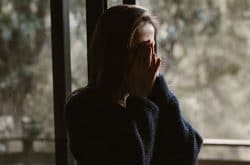Online predators lurk even in children’s games, and despite how much we try to protect our kids, anyone can be targeted – and it’s vital to know how to handle the situation if it happens to your family. North Shore Mum Jenny Hoey bravely shares her story of a chilling incident that happened to her daughter online.
I did not for a moment think something like this could ever happen to my kid, but it did, despite my vigilance.
This is my daughter’s story.
Amelia was 9 years old and full of life. She loved gymnastics and making slime. She also enjoyed playing children’s games on the computer.
As her mum, like most mums, I was aware of the dangers online. Our family had a big iMac in the most frequently used space in the home, a large open plan kitchen and dining area. There were parental controls on the computer and each child in the family was allocated age-appropriate time each day. Things like adult content, multi-game playing, and app downloads were all blocked. I had talked to all the family about why such restrictions were in place.
Then something changed. Over the course of a month or two, myself and Amelia’s stepdad noticed a distinct change in her. She was no longer interested in very much at all. She was eating noticeably less. She was looking very withdrawn. She had also developed an increased level of separation anxiety.

Online predators lurk even in children’s games, and despite how I tried to protect Amelia, our family was targeted.
While going for a walk one evening, Amelia asked us if we had dreams for the future, and then if everyone had dreams for their future. We asked with curiosity why she was asking. Amelia simply replied that she had ‘None’.
As parents, we were perturbed. Ameila had had her tonsils out a number of months earlier and we wondered if the general anaesthetic had contributed to this distinct change in mood.
A few weeks later, I received a call from the school. They asked me to come immediately to fetch Amelia. They told me she was very distressed and that they were unable to calm her down. When I arrived at the school, the teacher explained that nine-year-old Amelia had said, “Everyone in the world has a warm red heart but mine is cold and blue”.
I had phoned the paediatrician on the way to the school, sensing something was wrong, and we went immediately to see him. During the consultation, the paediatrician diagnosed Amelia with clinical depression and referred her to a psychologist, with a review in four weeks. He added that if there was no significant change in her mood, he would be left with no choice but to medicate her.
Amelia struggled to engage with the psychologist and one month later was prescribed an antidepressant. Despite initial hesitancy,x her stepdad and I acknowledged Amelia needed help.
I received a referral to see a different psychologist, one I had some previous connection with, and who was someone I trusted. Together my daughter and I attended counselling sessions. I followed the psychologist’s advice for home management to help Amelia with extreme separation anxiety. Amelia gradually improved and her medication was ceased six months later. Amelia did not, however, resume the activities that she had once enjoyed so much.
During the final year of primary school, when sex education was introduced, Amelia repeatedly told me she didn’t want to do it. Then, one night she called me into her bedroom. She was crying uncontrollably and was unable to speak through her tears. Shaking, she said, “Mummy, I have done something terrible”.
I gently asked her if she could tell me what she had done. Amelia shook her head but scribbled two words on a piece of paper —which were ‘sex’ and ‘computer game’. I registered what she may be trying to tell me.
Despite my internal feelings of distress, I remained composed. I sat down next to Amelia and wrapped my arms around her. Amelia pulled away and through her tears asked, “Are you not angry with me?”
I wrapped her up again and said, “No, my darling, you are a little girl, you are a curious little girl, you are no different from other little girls. You did something out of curiosity and there was somebody waiting on the other side who was pretending to be a child.”
Amelia looked at me and said, “No, no mummy, it was another child I was talking to. She said we’d both go to jail if I said anything to anyone, and every weekend, I’ve been scared that the police would find out and arrest me and take me away from you. I was so worried cause you always told us not to play with people we didn’t know.”
I just listened. Amelia was too upset to hear any reasoning from me.
Then Amelia said, “And Mummy I didn’t play the game just once. I went back.” She continued sobbing.
I responded by saying: “Sometimes when we do something, even if we know we shouldn’t, it feels exciting and good. It’s sometimes hard to feel the warning feelings.”
Amelia got some rest that night, relieved to have told me.
But I was troubled about how and where something like this could have happened. I had always been careful with play dates and Amelia did not like sleepovers. In addition, my heart sank as I realised that regardless of my vigilance, I had been unable to protect my child.
The next day, I called the police and asked them if they publish on their webpage a list of games that predators were known to frequent. They responded with, “No —predators are on all the games.”
The police asked if Amelia would be willing to come in and make a statement. I replied it wouldn’t be possible as Amelia could not speak about the incident.
The police left me with one message for my daughter: “Please tell your daughter that she is completely innocent. This is predator behaviour — they threaten the child and leave them afraid, sometimes too afraid to ever say anything.”
A few days later, I told Amelia that I’d called the local police. Amelia looked startled and afraid and said, “Why? are they going to come and take me away?”
I responded gently. “Absolutely not my darling. In fact, the police asked me to tell you that you are completely innocent, and that the other person was definitely a grown-up pretending to be a child who made you feel very scared.”
Amelia silently absorbed this. Since then, she has only been able to tell me little bits of information. She remains deeply ashamed. She tells me she played the game on someone’s laptop. She says they were only mimicking sex acts with the characters within the game. She says she was disgusted with herself.
In the time since, Amelia has responded positively to the compassion and empathy she continues to receive. She has found a passionate interest and is pursuing it. She is not your usual precocious teen. She accepts family rules and as her mum, she and I have frequent chats about various risks online — like predators, pornography, sexting and bullying.
She knows I have started to share her story by way of warning to others, and she understands why.
And why am I sharing this, you may ask? Why share this? This is not a ‘newsworthy’ story. It’s true that:
- Amelia never met her predator
- Amelia never sent photos of herself
- Amelia never received photos
But this is a common, regular story that too rarely gets told. A story which joins heaps of others in the ocean of ‘online’ trauma. A story which some might say is a ‘small’ incident, but which nevertheless left a child silently terrified for two years of her young life and robbed her of her innocence and vitality.
If Amelia had continued playing the game with this predator, who knows what may have happened. She was clearly in the process of being groomed. And it remains true that:
- Some children never tell.
- Some children try and are dismissed.
- Some children, like Amelia tell a safe adult, receive love and compassion, and the healing process begins.
And as for me, as her mum…
- I still feel sadness and I still choke up when telling the story.
- I still struggle to forgive myself for not fully protecting my child.
- I struggle daily knowing there are parents who have no online restriction in place, and who put their children and other children at risk. After all, I knows first-hand the effect this can have when something does happen.
My final thoughts? We need to hear more of these stories. We need to accept children’s innate curiosity and the vulnerability that comes with that and most importantly we need to ALL do better in protecting them.
Online predators: The Top 5 websites for Australian parents who want to protect their children and understand the online world
Jenny is the founder of the Facebook group Not My Kid, where current articles and situations are shared about online safety.












